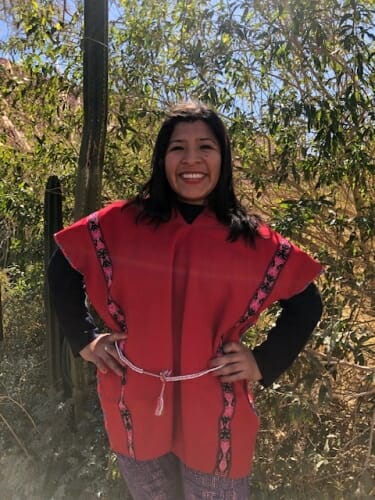New Faculty Focus: Mariaelena Huambachano
Title: Assistant Professor, Civil Society and Community Studies, School of Human Ecology
Hometown: I am originally from a beautiful seaside town in Southern Lima, Peru, called Chorrillos, and at a very young age I immigrated to New Zealand and the lively city of Auckland, New Zealand became my adopted hometown. So I am a Chorrillana and Aucklander.
Educational/professional background: I completed my bachelor’s degree in Massey University, New Zealand, in the student town of Palmerston North, and my master’s in international business in Massey University in the city of Auckland. I completed my Doctor of Philosophy in the University of Auckland and soon after it, I moved to the USA to start a postdoctoral research fellowship at Brown University.
Previous position: Postdoctoral researcher, Brown University
How did you get into your field of research? Indigenous cultural background and passion for preserving Mother Earth, traditional knowledge and agrobiodiversity.
What attracted you to UW–Madison? UW–Madison’s excellent reputation as a research institution and vibrant group of students and academics who are very passionate about their work, and in forging interdisciplinary research collaborations.
What was your first visit to campus like? It was a very inspiring and invigorating experience having a chance to be welcomed by wonderful colleagues, staff members and students, and learning about their experiences working and studying at UW, Madison.
What’s one thing you hope students who take a class with you will come away with? I once read a quote that encompasses the answer to this question: “I hope to communicate the remarkable potential we have as human beings for growth and change, be that through formal interventions or through positive relationships with others.” – Simon Goldberg
Do you feel your work relates in any way to the Wisconsin Idea? Definitely, my work focuses on the study of Indigenous ecologies of well-being and food sovereignty as entry points to the broader study of environmental ecology and biodiversity preservation with the view to develop alternative approaches to promote sustainable food systems, community-driven development, and overall well-being. In my work, to explore the role of Indigenous knowledge to improving food security and environmental and public policies. I utilize a novel theoretical approach by using the Traditional Ecological Knowledge (TEK) theory and rights-based approaches to food security complemented with community-based participatory research. I have forged close relationships and have worked intensively with multiple Indigenous communities across the world. Such relationships are of immense value to me, and they have influenced my aspiration for building international partnerships and coalitions with diverse Indigenous peoples, Intergovernmental organisations such as the United Nations and IPBES (Intergovernmental Science-Policy Platform on Biodiversity and Ecosystem Services).
What’s something interesting about your area of expertise you can share that will make us sound smarter at parties? While study of Indigenous communities has been undertaken, my work is the first to provide comparative research exploring the knowledge systems of two unique Indigenous groups of Māori and Quechua people in relation to food sovereignty, sustainable development and holistic well-being.
Hobbies/other interests: I love running, hiking and discovering a new place to eat healthy and delicious foods.

